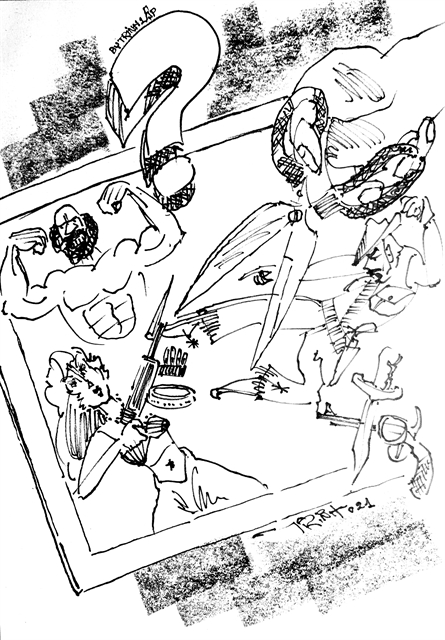 Society
Society

Do locally made movies about gangs influence violent behaviour in real life?

|
| Illustration by Trịnh Lập |
An Phương
Do locally made movies about gangs influence violent behaviour in real life?
At a recent meeting on revisions to the Law on Cinema, the chairman of the National Assembly’s Committee for National Defence and Security, Lê Tấn Tới, said that violent movies and dramas such as Người phán xử (The Arbitrator) have negative effects on viewers’ perceptions and tendency to commit crimes.
“After Người phán xử was aired on national TV channel VTV1, gang-related activities occurred more frequently,” he said, adding that someone should be responsible for this problem.
As reported in local newspapers, many movie experts have found the assumption to lack objectivity and evidence. Being a movie lover myself, I can’t help but agree with them.
“Người phán xử has been one of the most successful crime dramas aired during the 'golden time' and my family loves it!” Thu Hà, 28, told me.
“Since the drama depicts a number of violent scenes and profanity, I was honestly surprised to see them since Việt Nam is known for strict censorship. But I found Người phán xử to be very entertaining to watch,” she said.
Hà’s friend, Thanh Đa, told me dramas like Người phán xử had brought a breath of fresh air to the local movie scene.
“I grew up with so many family dramas and mostly saw gangster movies from overseas. To be honest, I hadn’t realised that Việt Nam needed more of this genre until Người phán xử came out. It has changed my perspective and levelled up my respect for local filmmakers. Don’t get me wrong! I’m not questioning their skills but praising their efforts in making something relatively rare to see in the industry,” Đa added.
I agree with them and appreciate local filmmakers tackling the topic of gangsters in a more direct manner and not shying away from making them one-of-a-kind experiences for locals who are fans of this genre.
“Some people have the right to say that drama can potentially affect viewers’ perception of crime, but it is more important to prove a real correlation between the two subjects,” Hà said.
“How about movies about broken families? Would viewers start considering divorce as the ultimate end of every marriage? How about films with characters trying to climb up the social ladder by engaging in bad behaviours? Would viewers be encouraged to do the same?” Hà said.
Filmmakers make stories about “the bad and the evil” in an effort to “awake” viewers with valuable lessons in life.
In fact, Người phán xử, after all, delivers multiple meaningful stories about family and love. Considering that its audience members are not children but adults with full cognitive capacity to control their behaviour, I believe jumping to the conclusion about the negative effects of violent movies on viewers without solid research is not persuasive.
More important things should be of concern now, in particular videos on YouTube with dangerous acts, which will potentially hurt younger viewers without supervision and guidance from adults.
“Children and adolescents are vulnerable groups that need better protection from harmful materials floating on the internet. As a parent, I’m looking forward to stricter control over the group of YouTube creators with click-bait and irrelevant content,” Ngọc Ánh, another friend of mine, told me.
“I’ve found multiple web dramas to contain negative messages to the younger audience. Since it is difficult to impose a legal framework on online content, I’ve been having a tough time looking after my son’s viewing time," Ánh said.
She added that the current penalties for YouTubers with harmful content for children are not strong enough to deter them from committing the act again.
According to many experts, movies should have elements in common with real life. And in a society with developed thinkers, movie viewers do not merely look for entertainment but also for sympathy to the pain, hardships and conflicts that main characters have to go through.
A developed movie industry is one where all assets of life are presented with transparency while filmmakers and their audience can have a conversation to truly dissect the matter, understand the world with open perspectives, and gain valuable lessons for themselves.
“The role of movies, I believe, is to reflect reality, and viewers should have the right to feel the beauty of it for themselves,” Đa said.
“Censorship is important to remove harmful content. However, authorities should put their minds in the shoes of both filmmakers and viewers to create an open field for filmmakers to express their creativity and fresh experiences for viewers who crave them," Đa said, adding that laws should be based on real demands in order for the movie industry to move forward sustainably.
We have also seen a fair amount of foreign movies with more violent acts, compared to Người phán xử and found them to be perfectly fine. Indeed, they are a crucial part to make movies’ plots more memorable.
Film director Nguyễn Hoàng Điệp said that Vietnamese films do not have as many advantages as their counterparts since strict censorship had discouraged local filmmakers with attractive topics to go beyond the limit.
Another film director, Nguyễn Quang Dũng, has warned that domestic and foreign investors might leave Việt Nam for another industry or safer markets if stricter rules were to be applied. - VNS




